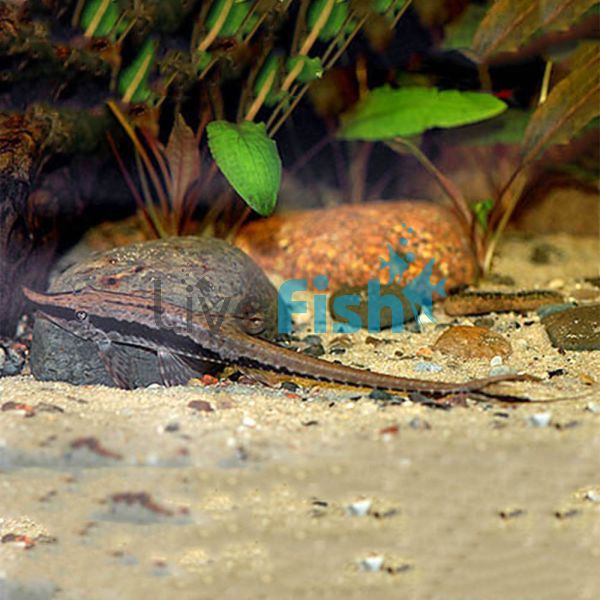Long Nose Whiptail 12cm
The Longnose whiptail has easily got to be one of the weirdest aquarium fish due to how they look and almost act like a twig. Having a slight resemblance to Pinocchio, this would be a great oddball species for catfish collectors or aquarists chasing a new breeding project. Whiptail catfish are similar to plecos and otocinclus in the way that they can make for a pretty good clean-up crew member.
- Buy 5 for $59.61 each and save 10%
- Buy 10 for $52.98 each and save 20%
Long Nose Whiptail
The Longnose whiptail has easily got to be one of the weirdest aquarium fish due to how they look and almost act like a twig. Having a slight resemblance to Pinocchio, this would be a great oddball species for catfish collectors or aquarists chasing a new breeding project. Whiptail catfish are similar to plecos and otocinclus in the way that they can make for a pretty good clean-up crew member. These fish are great algae eaters however whiptails tend to be heavy wood eaters which is always a unique behaviour to observe. They are relatively easy to breed but there is a niche and in-demand market for these fish hence they are quite popular in the catfish world. The reward and satisfaction of breeding or keeping these elusive fish are absolutely worth it.
Long nose whiptail catfish are easily in the top 10 list of oddball fish because they honestly don’t look real. Even if they feel threatened these fish will tend to have no movement to really resemble a twig in the water. They have quite slender bodies that narrow into basically a stick for the tail whilst having a flat underbelly. Their body colour is a chocolate brown with some minimal highlights through the back, there is a black line that starts thick from the nose and thins out as it ends at the tail. These are fish that will really adapt their colours given the tank set, in a darker environment their belly will basically be a similar brown to the back however in lighter systems, the belly will be white. When these fish are latched onto driftwood, they are practically invisible.
Trying to find the males and females in this species can be a challenge as males and females both grow bristles on the side of their faces. They can also only tend to reach maturity at around 15-20 cm so these will for sure be a long-term breeding project. The best method to breed these fish is to put a group of 5-6 individuals into a tank and let them naturally pair off and spawn. The eggs can be removed and artificially raised however most aquarists wait until the eggs hatch naturally and move the fry to a grow-out system. The habitat of the long nose whiptail is South America.
Tank Recommendations for your Long Nose Whiptail
Though the long nose whiptail is not an active species and tends to have a small profile, they can reach around 25 cm in length. The ideal aquarium for a group of these fish would be around 150 liters and it can be an incredibly simple and cheap system to run. These fish will be perfectly fine on a bare bottom system with some pleco caves, and an abundance of driftwood, and the aquarium can be filtered through some basic sponge filters. They will however also love a densely planted system with no problems at all. This species is most active when the lights are turned off.
Suitable Tank Buddies
The long nose whiptail catfish is extremely peaceful with aggression only ever coming out during breeding between males but this is always harmless bickering. These reclusive species will get along with a wide range of community fish.
Usually Compatible
Tetras, gouramis, Corydoras, angelfish, barbs dwarf cichlids such as rams and large peaceful cichlids such as geophagus.
Sometime Compatible
Fin-nipping species like banded leporinus and small schools of tiger barbs should be avoided as they can make short work of the streamer-like extensions on the long nose whiptail. This can lead to infection and unwanted stress for the catfish.
Rarely Compatible
large aggressive species such as African cichlids, Oscars and Jaguar cichlids. These species may try to eat the whiptail which could end in death for both fish. Because of the dense bone and armour plating the whiptail often gets lodged in the predator fish’s throat.
Feeding your Long Nose Whiptail Catfish
Long nose whiptails will easily take to a wide range of food and are arguably one of the easiest fish to feed. They are regarded as ‘wood eaters’ meaning they can easily sustain themselves eating aquarium driftwood. The best type of wood is Malaysian bog wood as this is a softer type and breaks down fairly easily. Do keep in mind that whiptails feeding exclusively on wood can lead to a lot of wood dust floating around in the water so some added mechanical filtration may be required. Aside from this they will eat algae and decaying plant matter but will also eat sinking aquarium foods like sinking pleco wafers. This can be supplemented with blanched veggies like zucchini and pumpkin.
| Scientific Name | Sturisoma Barbatum |
|---|---|
| Care Level | Easy |
| Common Names | Long nose whiptail catfish, Long nose farowalla catfish |
| Diet | Omnivore |
| Fish Family | Loricariidae |
| Lifespan (years) | 10 |
| Max. Length (cm) | 25 |
| Min. Tank Volume (l) | 150 Liters |
| Origin | South America |
| Reef Safe | Yes |
| Sociability | Peaceful |
| Venomous | No |
| Water Conditions | 24-26° C, pH 5.0-7.0 |




